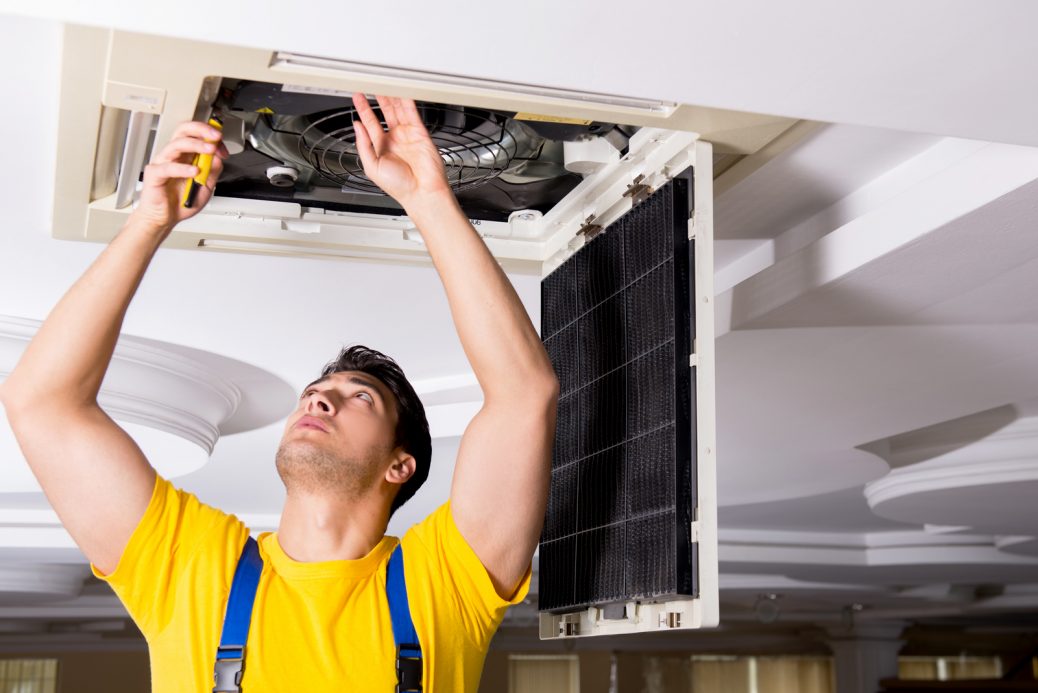Your AC becomes your best friend as the summers approach. But many times, it doesn’t provide the cooling it used to before. And as you sit drenched in your sweat, you wonder whether you should call in an expert or save money via the DIY route. Well, we’re here to help you determine whether your AC needs expert help. Let’s go!
Two Basic AC Maintenance Tips
Whether or not you hire professional AC maintenance services, you should always pay attention to at least two basic AC maintenance aspects. And if you’ve got the time, you should watch these simple video guides on troubleshooting air conditioning for common problems.
1. Clean and replace air filters
The air filters trap dust, pollen, pet dander, and other airborne particles. Over time, these filters can become clogged and obstruct airflow through the AC. This, in turn, can reduce its efficiency and increase your energy consumption as a result.
So, make sure you clean your air filters at least once every two months. It will ensure a longer lifespan of the AC unit as well as good cooling performance.
Here’s how to clean the air filters:
- Turn off your AC unit before accessing the filters
- Gently remove the filters from their slots
- If reusable, wash the filters with mild soap and water, and allow them to dry completely before reinstalling them
- For disposable filters, replace them with new ones of the same size and type
2. Keep the coils clean
There are two AC coils in each unit. These are:
- Evaporator coils in the indoor unit
- Condenser coils in the outdoor unit
Both are responsible for heat exchange during the cooling process. Over time, these coils can accumulate dirt and debris, which hinders their ability to transfer heat effectively.
Given this, make sure you clean both coils thoroughly at least twice a year. Here’s how to do it:
- Before cleaning, turn off the power to the AC system
- For the condenser coils (outdoor unit), use a garden hose to gently spray them from the inside out
- For the evaporator coils (indoor unit), use a soft brush or vacuum cleaner with a brush attachment to carefully remove dust and dirt
- Ensure that the coils are completely dry before restarting the AC unit.
When should you call an AC expert?
You should call an expert if you’re maintaining your AC at a basic level but it’s still not performing well.
Here are some indicators of poor AC performance:
No Cooling
When your AC fails to produce cool air despite being powered on or is producing bare minimum cool air, it is a clear sign of a significant problem. Some potential causes of this issue are:
- Clogged air filters
- Refrigerant leaks
- Compressor malfunctions
- Issues with the thermostat
Potential severity of damage
The lack of cooling compromises your comfort and indicates inefficiency within the AC system. It can lead to increased energy consumption as the AC unit struggles to reach the desired temperature. And this, in turn, will lead to higher utility bills. Moreover, continuous strain on the system can lead to a shortened lifespan of the AC unit in the long run.
Leaking water
Water pooling or dripping can result from blocked or damaged drainage lines, frozen evaporator coils, or a malfunctioning condensate pump.
Potential severity of damage
Water leaks can lead to mould growth and potential electrical hazards. If it’s continuous, it can also cause structural damage to your home, negatively impact indoor air quality, and pose health risks to occupants. This problem is usually due to hose leakage but only an AC expert can precisely identify the root cause.
Bad smell
Unpleasant or foul odours from your AC can indicate chemical leakage or growth of bacteria/mould within the unit or ductwork. If it’s a burning or musty smell, it may point to burning wires or similar electrical issues.
Potential severity of damage
Apart from making your living space uncomfortable, a foul smell from an AC unit also exposes you to health hazards. That’s because the air expelled by the AC contains mold and bacteria, which can lead to lung infections or allergies.
And if you smell burning, it’s an indicator that your AC is a continuous fire hazard to your home.
Sudden increase in energy bills
Increased bills are a result of increased energy consumption. If you suddenly start getting high energy bills without an obvious increase in your consumption, your AC might be at fault.
Although calling in an expert may result in a high initial cost, it’s more problematic when a malfunctioning unit is left untouched. Slowly decreasing your outgoings is key to ensuring that you can make the most of your retirement lifestyle and one of the first steps is making sure that your home is in top condition.















